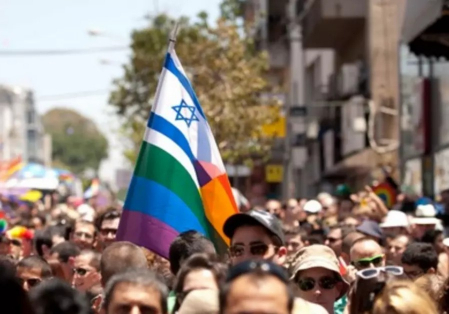LGBT Olim's Archives
Media coverage from the year of LGBT Olim’s launch
Online article in The Jerusalem Post
– June 6th, 2013
– June 6th, 2013
Article by Yoni Cohen on the Jerusalem Post’s website – “LGBT olim find their voice in time for Pride”.

| Israeli, LGBTQ flag.(Photo by: Hadas Parush) |
| With Tel Aviv Pride fast becoming one of the most popular and talked-about LGBT (Lesbian, Gay, Bisexual and Transgender) events on the global calendar, it would appear that Israelis have a lot to be proud about in terms of gay rights and acceptance. Thousands will take the streets on Friday to celebrate, waving flags and carry signs from the dozens of organizations that actively support the LGBT community in Israel. However, there is a small subsection of Israel’s LGBT community that is finding it hard to get its voice heard. While the plight of religious Jews or Arab minorities from the gay community has received widespread attention and formal groups are in place to help them, the status of LGBT olim (new immigrants) who make aliya from around the world is slightly more ambiguous. Many gay olim may not encounter prejudice and are free to live their lives as they choose, but still feel as if they are underrepresented in an official capacity. New oleh Roy Freeman is on a mission to change the situation and after being in Israel for just over a year has made significant progress on the issue. He talks to The Jerusalem Post about his initiatives to help the LGBT oleh community and build formal networks in order to help past, present and future olim. Freeman, who was born in the UK but moved to Sydney in 2001, made aliya from there in April 2012. He was involved in Dayenu, Sydney’s Jewish GLBT Community group, where he organized regular social events, as well as the group’s float in the Sydney Gay and Lesbian Mardi Gras Parade each March and a communal dinner for around 120 people at Emanuel Synagogue on the eve of the Parade. With his background in LGBT community projects, Freeman was ready to dive straight in when he came to live in Israel. However he very quickly realized that this would be impossible until he was completely fluent in Hebrew. “I wanted to meet LGBT Israelis but, other than the very well-advertised party scene and ‘dating sites’ like Atraf, there were no opportunities for meeting people in a purely social way,” he explains. “Building a good network of friends can make the difference between a new oleh or olah deciding to stay in Israel or going back home.” Freeman admits many straight olim also struggle to find their place in Israeli society, but for LGBT olim there’s “also the worry of coming out to people.” For many olim who were out and proud in their home countries, dealing with issue of coming out to a whole new set of people in a new country can cause anxiety. “You never know what reaction you’re going to get,” he says. As with most communities, the LGBT community in Israeli is strongly represented on Facebook with numerous pages and groups. However, Hebrew is the main language for these groups. There are also a number of pages and groups for new olim, many of which are in English,but none of them focus on the LGBT community. “The LGBT oleh community is unique,” Freeman notes. Realizing these problems, Freeman was quick to act. He started the Facebook group LGBT Olimback in April, and it already has almost 300 followers. The idea behind it is to bring together LGBT people who have made aliya, across the entire country, either recently or a long time ago, he explains. It is a platform to share information and experiences about aliya with the goal of making the process easier for new olim. As well as this, members of the group also share information about upcoming events that might attract LGBT olim. LGBT English Speakers is another social group that caters for members of the gay community, which focuses mainly on people in and around Tel Aviv. It was started in mid-2012 by two psychology students at Tel Aviv University as a social and support group. Freeman explains that an organizing committee was created by some of the more regularly attending members, including Arn (surname witheld), as well as Dar Harel who organizes events for women. The group now holds around three events each month and welcomes LGBT English-speakers, whether they’re olim, Israelis or visitors. Freeman highlights the need for these groups by stressing that people need support networks in their lives. “Moving to a new country is difficult, more so when learning a new language is involved, so I believe it’s important for people to find a community in which they feel welcome and safe,” he says. Tackling the notion that support groups such as these may force the LGBT olim community further away from Israeli society, Freeman responds by suggesting that “Israeli society isn’t purely about whether or not you speak Ivrit so having groups like ours doesn’t mean that we are not integrating.” He says it’s unrealistic for Israelis to expect new olim to forget their heritage and simply fit in. “Many new olimmove back home within the first three years of making aliya, so groups like ours can help increase the success rate for new olim.” With Gay Pride Month in full swing, the LGBT English Speakers and LGBT olim groups have realized the need to cater for the specific community that they represent. The LGBT English-speakers group (ESG) will be at Gan Meir on the morning of the Tel Aviv Pride March. The group will be sharing a stall with the Society for the Protection of Personal Rights for Gay Men, Lesbians and Bisexuals in Israel, known as the Agudah. Freeman says that members of the group manning the stall will be able to tell people about the social aspects and the events that they run. Joining the dozens of the other organizations that will be represented at the March itself, the ESG and LGBT Olim groups will hold banners and call on anyone who identifies with them to walk proudly and “know that they’re in good company.” Representing the first official event hosted by LGBT Olim, there will be a social meeting in a gay-owned cafe after the March. “We are hoping that LGBT olim from all over the country will be stopping by for some food, drink and a chat,” says Freeman. Aside from holding events, Freeman explains that the main aim of the LGBT Olim group is to bring people together, whether in person or virtually. “There are LGBT new olim who feel isolated – maybe because of their location or because they’re not completely out of the closet,” explains Freeman. “The Facebook page gives us a place to communicate with like-minded people and I am hoping that many people will come from all over Israel to Pride to meet each other and make connections.” He aims to build a community where people feel comfortable and welcome. “Making aliya can be very difficult and people need friendships and support networks.” Socializing and making connections is a big part of LGBT Olim, but Freeman has other goals. He takes issue with the fact that while LGBT organizations in Israel provide a high level of service for the community, the majority of the material and communication is in Hebrew. On the other hand, he highlights that the various organizations in place to help new immigrants “haven’t even considered that a proportion of the people they help to make aliya are LGBT and so none of their services cater for our specific needs.” Wasting no time, Freeman has already been in contact with the Jewish Agency and has explained that their current support offerings at best ignore or at worst exclude LGBT olim. “Having a Facebook page like LGBT Olim has helped them understand that there is a demographic that they have missed and we’re already in the process of fixing this by designing a program that will provide information and support specifically for LGBT new Olim,” he proudly states. |
http://www.jpost.com/LifeStyle/LGBT-olim-find-their-voice-in-time-for-Pride-315653


